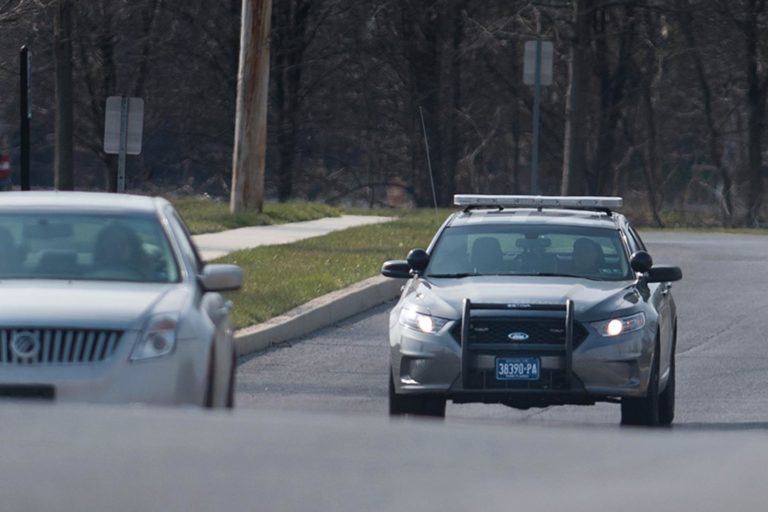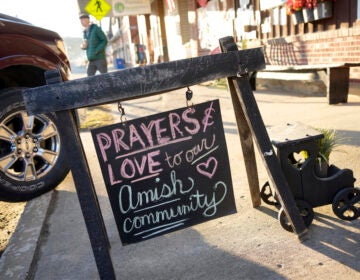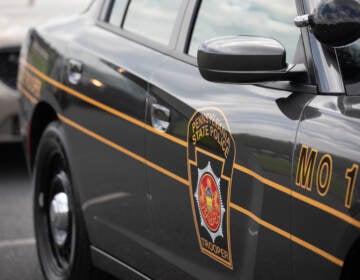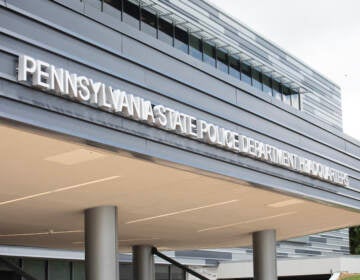Pennsylvania police cut services, plan for shortages as coronavirus spreads
“It's not like you can go out and arrest a bad guy and stop a problem. That's not going to stop this,” the police chief in Scranton said.

(Jose F. Moreno/The Philadelphia Inquirer)
This story was produced as part of a joint effort among Spotlight PA, LNP Media Group, PennLive, PA Post, and WITF to cover how Pennsylvania state government is responding to the coronavirus. Sign up for Spotlight PA’s newsletter.
Police officers across Pennsylvania are grappling with how to best protect their communities while at the same time protecting themselves, with many limiting contact with those reporting crimes, cutting outreach programs and even forestalling arrests.
Local departments and the State Police are also drawing up plans for what happens if the virus spreads among their ranks and creates an officer shortage.
“Regardless of what happens, we’re going to be providing service,” Scranton Police Department Chief Carl Graziano said. “But the level of that service, the intensity of that service, is going to depend on where this goes. And nobody knows at this time how far this is going to go.”
State health officials Thursday reported 185 confirmed cases in 22 of 67 counties, with most cases largely clustered in Montgomery County and surrounding areas. The day before, officials announced the state’s first death, a 55-year-old man from Northampton County.
Because of a lack of testing and other factors, however, experts say the virus is likely more widespread than case counts currently suggest.
In Scranton, police are telling residents to file reports of minor crimes not in progress through an online portal rather than in person at a station. The department barred public access to its lobbies for all non-emergencies or other needs such as records, permits or payments.
Internally, the department has ditched roll-calls — beginning-of-shift meetings with up to 25 people in a room — and instead is relaying information to officers electronically, Graziano said.
“There’s a lot more uncertainty with something like this,” he said. “You don’t know. You can take precautions, but it’s not like you can go out and arrest a bad guy and stop a problem. That’s not going to stop this.”
Other departments are taking similar measures.
In Erie, police now take reports of almost all minor crimes — such as theft or criminal mischief — over the phone and dispatch officers for a follow-up only if necessary. The department also stocked up on extra cleaning supplies to beat back the spread of the virus, and is in regular contact with the local health department and other officials.
“I don’t think we’ve faced this kind of situation in the past,” Police Chief Daniel Spizarny said. “We’re telling everybody to look for issues and think about what we may have coming. Let’s talk about plans to adjust and prepare.”
On Tuesday, the Philadelphia Police Department said it is scaling back arrests for non-violent crimes. In most cases, investigators will now temporarily detain suspects for processing and arrest them at a later date.
The department also said it has reassigned “plain-clothes” officers, put a temporary stop on all “nonessential” training, and halted its “Live Stop” vehicle impoundment program.
Departments are also creating contingency plans should the virus sideline their own.
“Officers are in a high risk for infection due to the nature of policing, and there’s a good chance that a considerable portion of any agency can be affected by it and be quarantined,” said Graziano, the Scranton chief.
“So there has to be a plan in place as to how do we continue to provide emergency services when our people are also affected by quarantines or hospitalized?”
Earlier this month, the department developed a response plan should its available personnel drop below 40% because of quarantines or infection. It declined to provide details of the plan, citing safety concerns.
The State Police has set up an Incident Command System to lead the agency’s coronavirus response, including what would happen if staffing shortages arose from the virus. That may include assigning troopers to shorthanded stations or to specialty positions, or changing response protocol for non-emergency calls, spokesperson Ryan Tarkowski said.
As of Thursday afternoon, none of the more than 4,200 troopers had tested positive for the coronavirus, the agency said.
Agencies are also widely canceling any community roles they served, including neighborhood watch units, community group meetings, and after-school programs.
”If people have issues or problems, obviously our phones and email are still working,” said Spizarny, the Erie chief. “We’re still here, but we’re avoiding any face to face contacts if at all possible.”
That dynamic is a “total reversal of how policing was done, even a week ago really,” Graziano said.
“When you’re dealing with something that’s known to have a criminal element or a certain particular trend in crime, those are things you’re trained to do,” he said. “But when you’re talking about a pandemic, it’s almost like stopping the wind. Where does it end?”
Law enforcement agencies said they have not yet been involved in enforcing Gov. Tom Wolf’s two-week shutdown of all nonessential businesses. Wolf said he expected businesses to comply voluntarily, though administration officials said this week that could change.
The Pennsylvania Liquor Control Board announced Wednesday that any licensees not complying with carry-out-only directive for good and alcohol could be subject to citations, suspensions and potential closure. A spokesperson for the State Police said no citations had been issued as of Thursday afternoon.
A State Police spokesperson said troopers performing “spot checks” throughout the state found that up to 95 percent of businesses subject to the order were in compliance, and they issued warnings to those who were not. No citations have been issued, the spokesperson said.
 100% ESSENTIAL: Spotlight PA provides its journalism at no cost to newsrooms across the state as a public good to keep our communities informed and thriving. If you value this service, please give a gift today at spotlightpa.org/donate.
100% ESSENTIAL: Spotlight PA provides its journalism at no cost to newsrooms across the state as a public good to keep our communities informed and thriving. If you value this service, please give a gift today at spotlightpa.org/donate.
WHYY is your source for fact-based, in-depth journalism and information. As a nonprofit organization, we rely on financial support from readers like you. Please give today.


![CoronavirusPandemic_1024x512[1]](https://whyy.org/wp-content/uploads/2020/03/CoronavirusPandemic_1024x5121-300x150.jpg)


